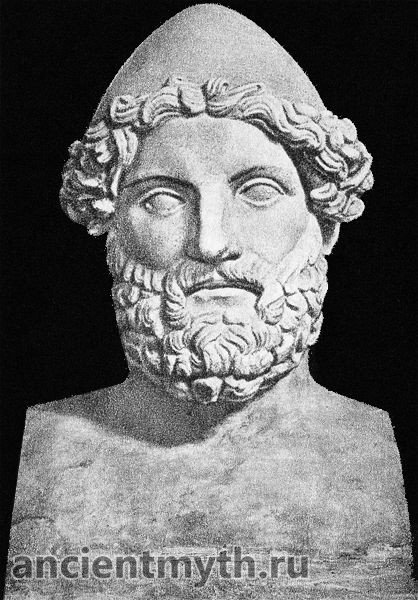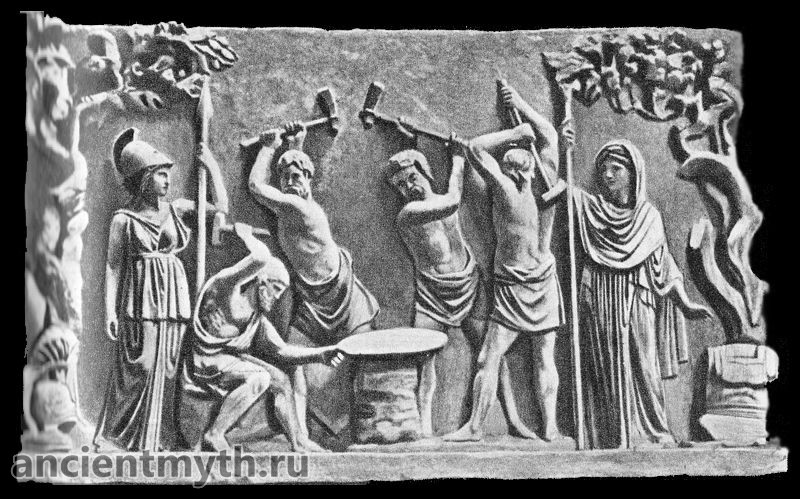Hephaestus
Hephaestus, son of Zeus and Hera, the god of fire, the blacksmith god, with whom no one can compare in the art of forging, was born on the bright Olympus as a weak and lame child. The great Hera became angry when they showed her an ugly, frail son. She grabbed him and threw him down from Olympus to a distant land.

For a long time the unfortunate child rushed through the air and finally fell into the waves of the boundless sea. The sea goddesses took pity on him - Eurynoma, daughter of the great Ocean, and Thetis, daughter of the prophetic sea elder Nereus. They raised little Hephaestus, who had fallen into the sea, and carried him away with them deep under the waters of the gray Ocean. There, in the azure grotto, they raised Hephaestus. The god Hephaestus grew up ugly, lame, but with powerful arms, a broad chest and a muscular neck. What a marvelous artist he was in his blacksmithing trade! He forged a lot of magnificent jewelry from gold and silver for his teachers Eurynome and Thetis.
For a long time, he harbored anger at his mother, the goddess Hera, in his heart, and finally decided to take revenge on her for throwing him off Olympus. He forged a golden chair of extraordinary beauty and sent it to Olympus as a gift to his mother. The wife of the Thunderer Zeus was delighted when she saw a wonderful gift. Indeed, only the queen of gods and men could sit on a chair of such extraordinary beauty. But - oh, horror! As soon as Hera sat down in a chair, as indestructible fetters wrapped around her, and Hera found herself chained to the chair. The gods rushed to her aid. In vain - none of them was able to free Queen Hera. The gods realized that only Hephaestus, who forged the chair, could free his great mother.

They immediately sent the god Hermes, the herald of the gods for the blacksmith god. Hermes rushed like a whirlwind to the ends of the world to the shores of the Ocean. In the twinkling of an eye, he swept over the earth and the sea and appeared in the grotto where Hephaestus worked. For a long time he asked Hephaestus to go with him to the high Olympus - to free Queen Hera, but the blacksmith god flatly refused: he remembered the evil that his mother had done to him. Neither the requests nor the pleas of Hermes helped. Dionysus, the cheerful god of wine, came to his aid. With a loud laugh, he offered Hephaestus a cup of fragrant wine, followed by another, and after it another and another. Hephaestus was drunk, now it was possible to do everything with him - to lead anywhere. Dionysus, the god of wine, defeated Hephaestus. Hermes and Dionysus put Hephaestus on a donkey and took him to Olympus. Hephaestus rode swaying. Around Hephaestus, raging maenads entwined with ivy, with thyrsus in their hands, rushed in a cheerful dance. Intoxicated satyrs jumped clumsily. Torches smoked, tambourines rang out loudly, laughter, tambourines rattled. And ahead was the great god Dionysus in a wreath of grapes and thyrsus. The procession moved merrily. At last they came to Olympus. Hephaestus released his mother in an instant, now he did not remember the offense.
Hephaestus remained to live on Olympus. He built majestic golden palaces for the gods and built himself a palace of gold, silver and bronze. In it he lives with his wife, beautiful, friendly Kharita, the goddess of grace and beauty.
The forge of Hephaestus is located in the same palace. Hephaestus spends most of his time in his forge full of wonders. In the middle stands a huge anvil, in the corner - a forge with blazing fire and bellows. These bellows are wondrous - they do not need to be set in motion by hands, they obey the word of Hephaestus. He will say - and the bellows work, fanning the fire in the forge into a brightly bursting flame. Covered with sweat, all black from dust and soot, the blacksmith god works in his forge. What marvelous works Hephaestus forges in it: indestructible weapons, jewelry made of gold and silver, bowls for goblets, tripods that roll themselves on golden wheels as if alive.
Having finished the work, having washed sweat and soot in a fragrant bath, Hephaestus goes, limping and staggering on his weak legs, to the feast of the gods, to his father, Zeus the Thunderer. Affable, good-natured, he often stops the quarrel between Zeus and Hera that is ready to flare up. Without laughter, the gods cannot see how the lame Hephaestus hobbles around the banquet table, spilling fragrant nectar to the gods. Laughter makes the gods forget quarrels.
But the god Hephaestus can be formidable. Many they experienced the power of his fire, and the terrible, mighty blows of his huge hammer. Even the waves of the raging rivers Xanthus and Simois were humbled under the fire of Troy by Hephaestus. Terrible, he struck with his hammer and mighty giants.
Great is the god of fire, the most skillful, divine blacksmith Hephaestus, - he gives warmth and joy, he is affectionate and friendly, but he also punishes menacingly.